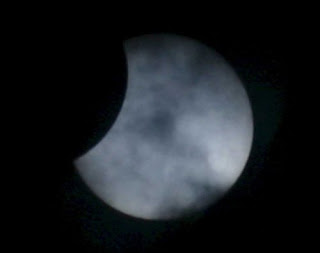The first in the series of 3 eclipses (seen in
The uniqueness of the three is that they all fall on special days –
on Aadi Amavasya, AvaNi avittam and Thai Amavasya / SOmavaadi Amavasya,
known for special rituals to pithrus and rishis (AvaNi avittam).
http://www.astronomy.com/asy/default.aspx?c=a&id=7260
No eclipse comes without an astro- prediction.
It is also customary to dismiss such predictions as superstitious.
This post is to put forth some information on how this must be viewed.
Almost every race on the earth has some information or prediction connected to eclipses.
The obvious reason is that eclipse is an easily observable celestial happening
from the time of early man.
But it must also be acknowledged that
the events that followed would have been observed by man
from those times onwards and
a correlation could have been noticed.
So it is rather not about fear of the celestial happening.
It is about the events that followed
that gave rise to fear of eclipses.
The fear of the luminaries being eaten up by the snakes – Rahu or Ketu
is not at all enunciated by ancient texts on Jyothisha.
Such stories are in stories and not in astrology texts.
Though Bhaskara II and Varahamihira acknowledged them
as stories of mythology,
they however had not explained the eclipses
on the basis of these stories.
For instance, Varahamihira had stated (Brihat Samhita)
that people knew how eclipses were formed.
They knew that they were not formed by the snakes.
The snake- connection is an allusion
to drive home the message of conflict between
spiritual (Ketu) and material (Rahu) wishes
by which our life is entangled
with the snakes
trying gulp our self (sun)
and mind (moon).
All the Siddhanthic literature in Jyothisha
do not speak about rahu - Ketu story of swallowing
the sun or the moon.
Instead they give detailed accounts on how the eclipses occur
and ways to calculate the time, duration etc.
Thus Vedic astrology can not be accused of
promoting superstition,
as predictions are not made just like that.
The predictions are not to mean that
eclipse ‘makes’ the happenings.
It is rather that eclipse – indicates what is to come.
Infact the entire rationale behind astrology is
indicative and not causative.
It is like the clock we have
which shows what time of the day it is.
It does not make the time.
It only shows the time.
We say "oh its 8 o clock, time to catch bus".
The clock does not make the bus to come.
It only tells that the bus is likely to come then.
That is why we say that stars and planets
do not 'make' things happen. They only 'indicate' what is to happen.
Patterns have been developed
and referred to periodically or whenever required,
so as to avoid mishaps.
That is why astrology is originally not predictive,
it is indicative.
This is here the scope of astrology lies.
Coming to the present topic on eclipses,
they have been observed for long by mankind.
Infact the core of the astrology developed by the Babylonians
was about the 18 year cycle of completion of
one round of the nodes (rahu & ketu)
Theirs was the “Grahana yuga”.
They found that eclipses repeated in this 18-year cycle
and accordingly noted the events following the eclipses.
This is how the body of information
on eclipses and their results were made.
Vedic astrology is far advanced than this –
in that there had been observations and cross- checking
and also enunciation of theories
incorporating many factors
that had been given by Maharishis in their wisdom.
For instance, any prediction on eclipse
(or for that matter any other issue)
must take into account the
house it falls (the bhava aspects),
the rasi sign (fixed, moving etc / firy, earthy etc)
the rasi and its lord and their nature. Etc.
The information about rasi, bhava, planets
and planetary karakattwa are like basal tendencies.
These basic tendencies indicate the nature of results.
They don’t make results.
The results are always there tied up to space and time.
If one is susceptible, one experiences the results.
That susceptibility is due to karmic balance that is to work itself out.
That is why for the same indication in astrology,
not all people belonging to the ‘risk’ category
experience the same predicted results.
The case for eclipses are of different category.
They come under mundane / Medhini astrology.
They indicate effects on vast areas.
The timing, the duration and nature are all
indicated by the rasi, bahva,
nature of lords, planets and rasis etc.
How the eclipses come to bear some relevance to pithru tarpan
had been already discussed in this blog.
http://jayasreesaranathan.blogspot.com/2008/02/location-of-pithru-loka.html
http://jayasreesaranathan.blogspot.com/2008/02/earth-in-grip-of-sun-pithru-loka-and.html



4 comments:
Whoever owns this blog, I would like to say that he has a great idea of choosing a topic.
very cool.
நல்ல விளக்கம். அருமை!
My thanks to Geetha and others.
Post a Comment